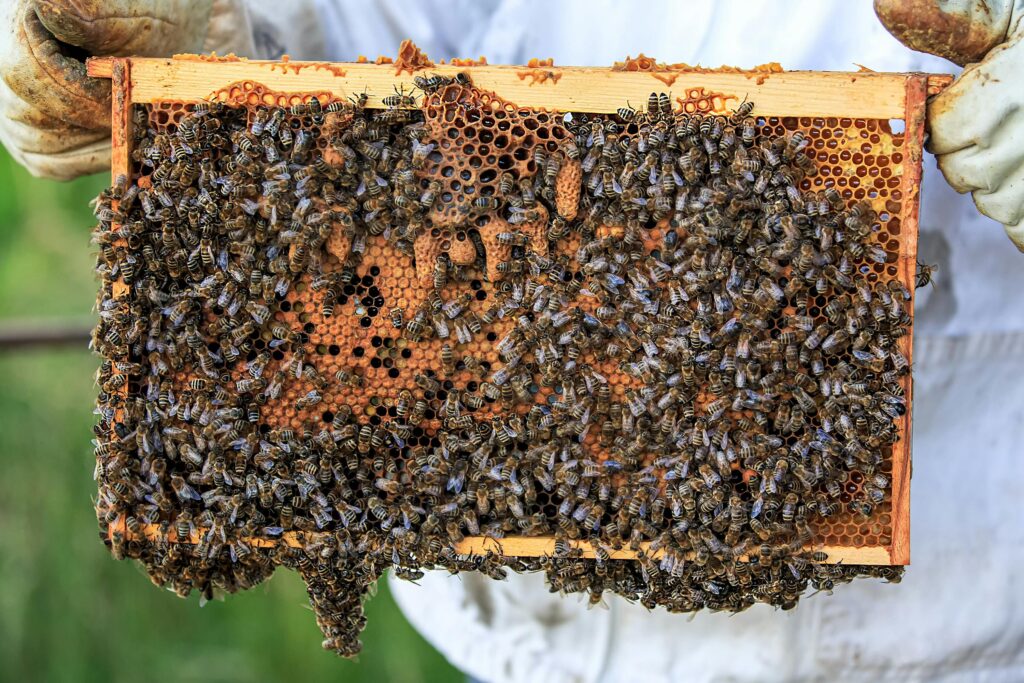
Among the pantheon of natural superfoods, bee bread stands out for its profound nourishing and healing properties. Produced by honeybees through the fermentation of pollen, bee bread overflows with essential vitamins, minerals, probiotics and enzymes that promote whole-body wellness. Consuming bee bread regularly can boost energy, strengthen immunity, support digestion, and contribute to radiant skin and hair. As both a nutritional powerhouse and embodiment of natural symbiosis, bee bread has rightfully earned its status as one of nature’s most valuable superfoods.
Bee Bread Basics: Origins and Production
Bee bread begins with industrious honeybees venturing outside the hive to gather pollen from flowers. Worker bees collect pollen on the hairy parts of their bodies as they flit from bloom to bloom. Using their legs, they comb and pack the pollen grains into pouches on their hind legs. Upon returning to the hive, the bees add nectar or honey to the pollen and mix it thoroughly. This sticky pollen blend gets packed into honeycomb cells, where beneficial bacteria initiate lactic acid fermentation.
Over the next several weeks, enzymatic processes break down complex nutrient compounds into more bioavailable forms. Nutritional changes also occur through the action of the fermenting microbes. The end result of this transformative process is bee bread, characterized by a tangy, deeply aromatic flavor and concentrated nutrition content. Beekeepers are careful to harvest the mature bee bread without disrupting the hives.
Nutrient Profile: A Spectrum of Essential Vitamins and Minerals
True to its classification as a superfood, bee bread contains a wealth of essential vitamins and minerals. It averages around 40% high-quality protein, making it an excellent source for amino acids that support muscle and tissue health. Abundant B vitamins, including riboflavin, niacin and pantothenic acid, enable efficient cellular energy production. Phenylalanine, an amino acid precursor to tyrosine, helps regulate mood and appetite.
Bee bread also provides significant amounts of vitamin C, magnesium, calcium, potassium, phosphorous, manganese, and iron. These minerals strengthen bones, optimize enzyme function, and improve oxygen transport and nerve transmission. Bee bread contains over 5,000 enzymes that catalyze digestive processes and amplify nutrient absorption. It also delivers polyphenols and carotenoids, which function as antioxidants to counter damaging oxidative stress.
The Power of Probiotics
One of the most valuable features of bee bread lies in its high probiotic content. The lactic acid bacteria that carry out the fermentation process continue to live on in the final bee bread. These microorganisms help repopulate the intestinal microbiome with friendly bacteria that promote better digestion, improved immunity, and an overall symbiotic relationship with the host.
Regularly consuming bee bread introduces millions of beneficial bacteria that can bring the gut flora into proper balance. This enhances nutrient absorption and facilitates waste elimination. The anti-inflammatory effects of certain probiotics may also have positive implications for chronic inflammatory conditions.
Whole-Body Effects: Energy, Immunity, Digestion, and More
Incorporating bee bread into your lifestyle can have wide-ranging whole-body effects:
- Increased energy and stamina from amino acids, B vitamins, and minerals
- Immune system support through antioxidants, vitamins C and E, and probiotics
- Improved digestion and gut health via enzymes and probiotics
- Healthy skin, hair, and nails through nutrients like silica and biotin
- Mental clarity and focus with B vitamins, amino acids, and antioxidants
- Stress management from nutrients that balance hormone levels
- Anti-aging effects from anti-inflammatory compounds and antioxidants
Simple Ways to Consume Bee Bread
The good news is that bee bread is simple to enjoy on a regular basis. It delivers its exceptional nutritional payload through versatile applications:
- Sprinkle raw bee bread onto yogurt, oatmeal, salads or soups
- Blend into smoothies, protein shakes, lattes, or hot cereals
- Mix into granola, energy bars, trail mixes or nut butters
- Infuse into honey or bake into breads and muffins
- Brew as a nutritious bee bread tea or use in bone broths
- Use as a natural face mask or nourishing hair treatment
Embrace the Wisdom of Nature
Allowing bees to transform simple pollen into a functional superfood demonstrates nature’s astonishing wisdom. Bee bread has rightfully earned its place among the great natural healing foods revered throughout history. Harnessing its nourishment supports our innate drive towards optimal health and well-being. By embracing bee bread’s gifts, we tap into the synergistic intelligence of bees, flowers, and the processes that unite them.



